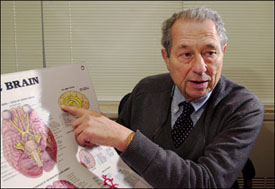In Memory Of… Jerome Kagan
Honoring scientists who have made important and lasting contributions to the sciences of mind, brain, and behavior.
Jerome Kagan, PhD (1929-2021)
Daniel and Amy Starch Professor of Psychology, Emeritus
Harvard University
Jerome Kagan was one of the major developmental psychologists of the twentieth century. He was a pioneer in reintroducing physiology as a determinant of psychological characteristics. The Daniel and Amy Starch Professor of Psychology, Emeritus at Harvard University, Kagan won numerous awards, including the Hofheimer Prize of the American Psychiatric Association (1963) and the G. Stanley Hall Award as well as the Distinguished Scientific Award of the American Psychological Association (APA).
He served on numerous committees of the National Academy of Sciences, the President’s Science Advisory Committee, the Social Science Research Council, the National Institute of Mental Health, and on the National Research Council. Kagan was also the former director of the Mind/Brain Behavior Interfaculty Initiative at Harvard University. In an empirical study by Haggbloom, et al, using six criteria such as citations and recognition, Kagan was found to be the 22nd most eminent psychologist of the 20th Century, just above Carl Jung.
 Kagan was born in Newark, New Jersey in 1929, the son of Joseph and Myrtle (Liebermann) Kagan. Kagan graduated from Rutgers University in New Jersey in 1950 with a B.S. degree and in 1951 he married Cele Katzman; the couple have one daughter. Kagan earned his PhD from Yale University in 1954 and received an honorary master’s degree from Harvard University in 1964. He also spent one year as an instructor in psychology at Ohio State University. Following two years as a psychologist at the U.S. Army Hospital at West Point, Kagan joined the Fels Research Institute in Yellow Springs, Ohio, as a research associate. In 1959, he became chairman of the Department of Psychology there.
Kagan was born in Newark, New Jersey in 1929, the son of Joseph and Myrtle (Liebermann) Kagan. Kagan graduated from Rutgers University in New Jersey in 1950 with a B.S. degree and in 1951 he married Cele Katzman; the couple have one daughter. Kagan earned his PhD from Yale University in 1954 and received an honorary master’s degree from Harvard University in 1964. He also spent one year as an instructor in psychology at Ohio State University. Following two years as a psychologist at the U.S. Army Hospital at West Point, Kagan joined the Fels Research Institute in Yellow Springs, Ohio, as a research associate. In 1959, he became chairman of the Department of Psychology there.

Since the late 1920s, scientists at Fels had been studying middle-class children from infancy through adolescence in order to better understand human development. At that time, most psychologists believed that personal characteristics were determined by environmental factors rather than by inheritance. Kagan’s early research at Fels focused on the degree to which individual personality traits carried through from infancy and childhood to adolescence and beyond. On re-examining some of the Fels subjects as adults, Kagan and Howard Moss did not find strong support for the maintenance of behavioral characteristics such as aggression, dominance, competitiveness, and dependence. However, they found that a small group who had been very fearful as toddlers had retained aspects of this “behavioral inhibition” as adults. In 1962, Kagan and Moss published their landmark book Birth to Maturity.
Professor Kagan’s highly-respected and groundbreaking research on the cognitive and emotional development of a child during the first decade of life focused on the origins of temperament. He tracked the development of inhibited and uninhibited children from infancy to adolescence. Kagan’s research indicated that shyness and other temperamental differences in adults and children had both environmental and genetic influences. A shy adult was more likely to have been high-reactive (fearful) in infancy and childhood than their bold and sociable counterparts, who were most likely low-reactive.
Individuals Honoring Jerome Kagan:
Doreen Arcus, University of Massachusetts
Adele Diamond, University of British Columbia
Kurt Fischer, Harvard University
* Susan Fiske, Princeton University
Nathan Fox, University of Maryland, College Park
Robert Frender, University of Alberta
Sidney Goldberg
Sara Harkness, University of Connecticut
Janet Kagan
Sara Rimm Kaufman
Ken Livingston, Vassar College
Eric Loken, Pennsylvania State University
* Fred Morrison, University of Michigan
* Nora Newcombe, Temple University
Michael Novey
J. Steven Reznick, University of North Carolina, Chapel Hill
Sarah A. Roehrich
Barbara Rogoff, University of California, Santa Cruz
Daniel Schacter, Harvard University
Martha Julia Sellers, Tufts University
Charles Super, University of Connecticut
Debbie Sorensen
Rosa Arriaga, Georgia Institute of Technology
* The FABBS Foundation would like to thank Dr. Susan Fiske, Dr. Fred Morrison, and Dr. Nora Newcombe for nominating Dr. Kagan for this honor and for leading the effort to spread the word about his nomination.
